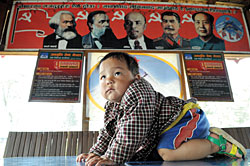 CHONG ZI LIANG |
Nepal was one of his party's nominees in the statute drafting committee in 1990 that opted for the Westminster model. But no sooner were the general elections held than the People's Volunteers (the predecessors of the Youth Force) were uprooting footpath railings and burning telephone booths in the capital. Even during the UML's stint as a minority government in 1994-1995, its parliamentarians never stopped ridiculing 'bourgeois' democracy.
At the height of the Maoist insurgency in 2001, the UML boycotted the entire winter session of parliament. This contributed significantly to the untimely demise of the 1990 constitution.
Egged on by the military, Sher Bahadur Deuba dissolved parliament in May 2002. But the UML kept its head buried in the sand while democracy faltered and the Maoists rehearsed their sequential farces in places as far apart as New Delhi, Lucknow and Siliguri in India.
Nepal then endorsed Gyanendra's dictatorial ambitions by authorising UML's participation in Deuba's government of 'half-corrected regression' five years ago. Lest it be forgotten, the Marxist-Leninists were full-fledged partners of the first elected Maoist government in the world, and they are equally responsible for all the acts of the Dahal cabinet.
That was then, when Nepal and Dahal were comrades-in-arms. By his own admission, Premier Nepal helped Pushpa Kamal Dahal refine his directing skills. Now he claims that he is the best person to stop the Maoist narrative being enacted because he was involved in their conceptualisation: that he is the last liberal standing between a Maoist takeover and a rightist backlash. Even by UML standards, this is duplicity of a remarkable order.
Liberalism was once a political principle that favoured social progress by reform. Its tactics were based on the belief that more enduring social transformations could be achieved by peaceful politics and institutional reform rather than by violent revolutions. It has now come to stand for a politics of fear.
Premier Nepal is not alone in seeing phantoms wherever he looks. Conservatives are afraid of secularism and the spectre of proselytising missionaries. Moderates are alarmed by the rise in Chinese influence. Nationalists fear Indian domination. The mainstream is scared of radicals on the left and right. Industrialists don't want trade unions.
Bureaucrats hate the prospect of working under a stable political leadership. The army is itching to flex its muscles. The police don't want to reform. Nobody wants to face the great unknown - federalism.
Fear of communism has always been a potent weapon. At root it constitutes status anxiety, in this case the fear of losing what one has. In Nepal, anti-Maoism is a consequence of the neoliberal policies of privatisation and trade liberalisation pursued with vigour since the late 1980s. These policies, coupled with the development industry, have created a comfortable class in the Kathmandu valley that is loath to give up any of its privileges. But the more the elite resists, the more the Maoists become popular among those rural millions neglected or even exploited by neoliberal policies.
Pushpa Kamal Dahal could have coolly waited for the 22-party coalition to crumble under the weight of its own contradictions. But neighbouring countries are breathing down his neck to accept a compromise. So the Maoists are accumulating political capital. It may come in handy at the next elections. Meanwhile, the status quo will linger on until the time the UML decides whether it wants to be Leninist or liberal.
READ ALSO:
"No government change until constitution written, elections held", Interview with Prime Minister Madhav Kumar Nepal - FROM ISSUE #474 (30 OCT 2009 - 05 NOV 2009)



